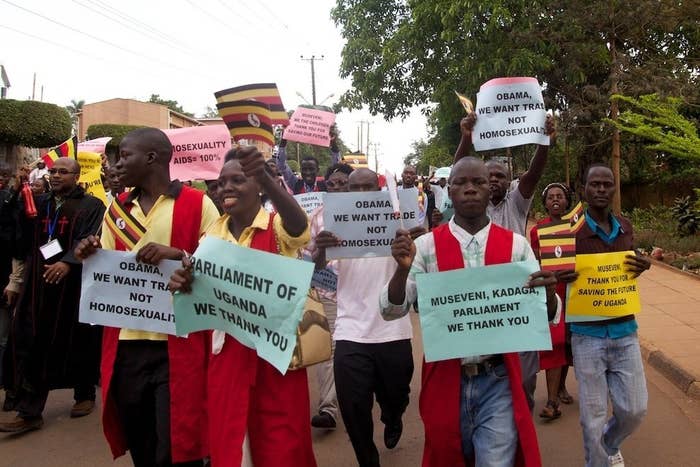
The White House announced Thursday that it would cancel a U.S.-funded aviation exercise with Uganda and impose a visa ban on officials involved in human rights abuses and corruption as part of a package of steps in response to enactment of the Anti-Homosexuality Act in February.
"As President Obama has stated, the Government of Uganda's enactment of the Anti-Homosexuality Act (AHA) runs counter to universal human rights and complicates our bilateral relationship," said the NSC Spokesperson Caitlin Hayden in a statement.
In addition to the travel ban and the cancellation of the aviation exercise, the White House also announced that it is "redirecting funds for certain additional programs involving the Ugandan Police Force, Ministry of Health, and National Public Health Institute."
Hayden's statement added that none of these measures "diminishes our commitment to providing development and humanitarian support for the Ugandan people, or our partnership with the Ugandan government to counter the murderous Lord's Resistance Army and improve security in Africa."
While the US announced some small funding adjustments in late March because of the law, human rights and public health advocates in Uganda and in the US have grown increasingly frustrated with the Obama administration for responding more substantially. They also have criticized the U.S. for sending mixed messages, undermining the impact of the March announcement by simultaneously unveiling military aid important to Ugandan President Yoweri Museveni. Even when an internal review process had put forward recommendations for additional steps in May, the White House delayed taking action.
But initial reaction has been positive to the steps announced today.
Head of Sexual Minorities Uganda Frank Mugisha told BuzzFeed, "The measure have come at an important time because politicians and other governments think the US won't react" to the passage of anti-LGBT legislation. "For me it's not only about Uganda, it's about other countries where politicians think they can use discrimination and homophobia for political purposes and get away with it."
Wade McMullen of the Robert F. Kennedy Center for Human Rights praised the action, but said he hoped the administration "has learned a lot through this process," so that responses to other countries with recently passed anti-LGBT legislation such as Russia and Nigeria "are under way." And the next time a country passes a similar law, he added, hopefully "their ability to react more efficiently or effectively and take action sooner" is improved.
The White House will follow today's announcement with a "Forum on Global LGBT Human Rights" on Tuesday with a keynote address from National Security Advisor Susan Rice.
A post on the White House blog gave these details about the new steps:
— Restricting entry to the United States. We want human rights abusers, worldwide, to know their misdeeds are not unnoticed and would-be human rights abusers to understand that there are consequences for engaging in such actions. The State Department is therefore taking steps consistent with its current authorities (including Presidential Proclamation 8697) to restrict the entry into the United States of specific Ugandan individuals involved in serious violations or abuses of human rights, including those determined to have committed such violations or abuses against LGBT individuals. While we will not identify the individuals whom we have watch-listed in line with confidentiality requirements, this step makes clear our commitment to sanctioning individuals determined to have perpetrated human rights abuses or who are responsible for such acts in the future. In addition, the United States will also take steps consistent with current authorities to restrict entry into the United States by Ugandans who are found responsible for significant public corruption.
— Ceasing support for Uganda's community policing program. We are very concerned about the extent to which the Ugandan police may be involved in abusive activities undertaken in the name of implementing the AHA. These concerns relate to the April 3 raid on a U.S.-funded public health program at Makerere University, as well as credible reports of individuals detained and abused while in police custody. Therefore, even as we continue to press the police at every level to fulfill their responsibility to protect all Ugandans, we will also be discontinuing a $2.4 million program in support for the Uganda Police Force community-policing program.
— Redirecting certain financial support for the Ministry of Health (MOH) to other partners. We remain steadfast in our commitment to supporting the health needs of the Ugandan people, but we seek to invest in partners and programs that share our commitment to equal access and our evidence-based approach to medicine and science. We are accordingly shifting a portion of our financial support for MOH salaries, travel expenses, and other items to health-related activities being undertaken by non-governmental partners in Uganda. These modifications will focus on MOH central headquarters staff in order to avoid negatively affecting health care workers and direct service providers in Uganda.
— Relocating funds for a planned public health institute and other measures relating to health programming. For similar reasons, we are relocating to another African country the planned establishment of a National Public Health Institute, for which we would have provided approximately $3 million in funding. We have also relocated a National Institutes of Health genomics meeting from Uganda to South Africa.
—Cancelling a military aviation exercise. We have also cancelled plans to conduct the Department of Defense's Africa Partnership Flight exercise in Uganda. This was intended to be a United States African Command (AFRICOM)-sponsored aviation exercise with other East African partners.
On Thursday, Rhode Island Democratic Congressman David Cicilline introduced a bill that would create a law banning foreigners who committed gross human rights violations against LGBT people from entering the United States. Human Rights First welcomed the proposal, issuing a statement that called it "an important step in ensuring that the individuals responsible for egregious human rights violations against LGBT people are held to account for their crimes."
